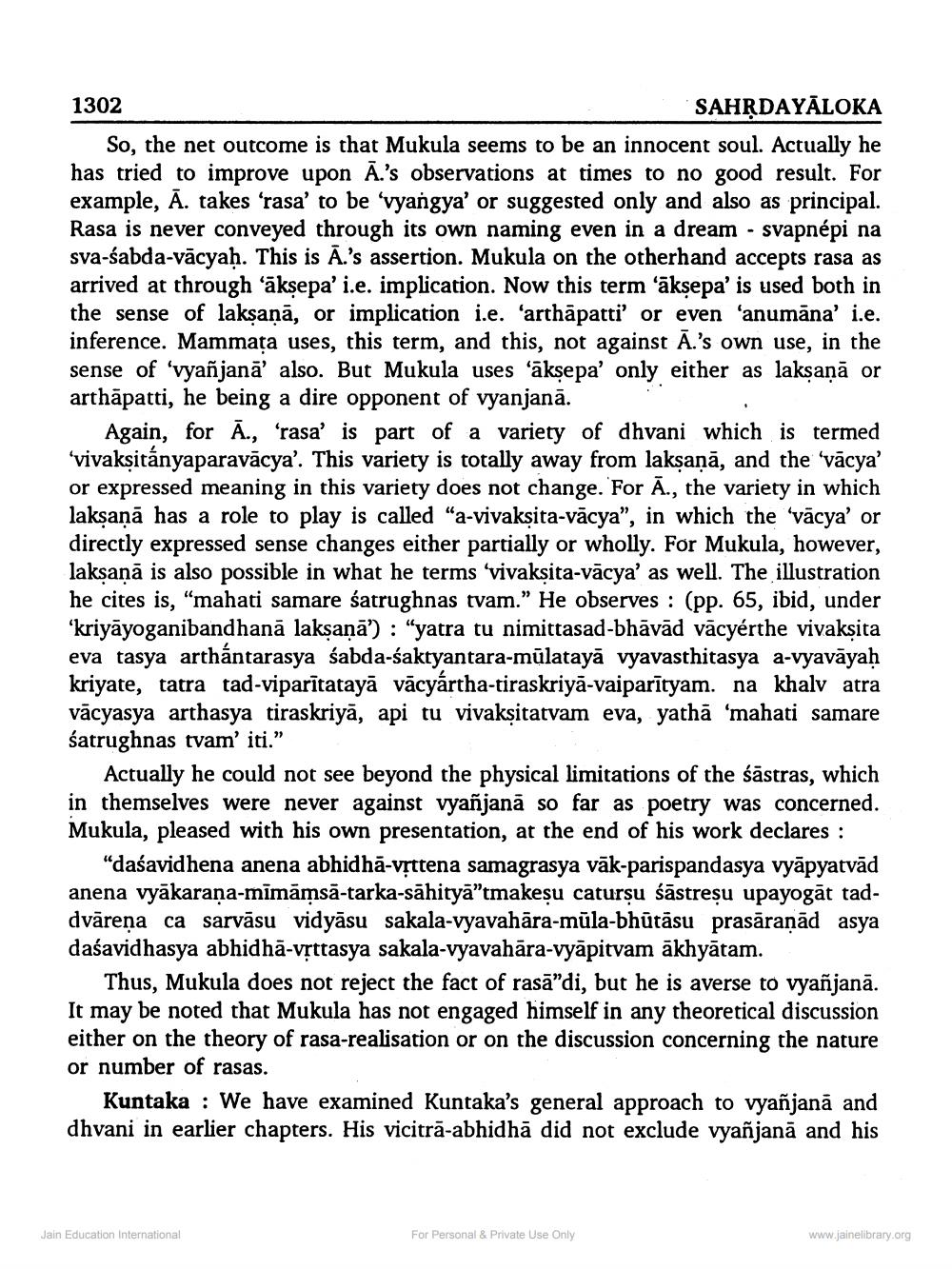________________
1302
SAHRDAYĀLOKA So, the net outcome is that Mukula seems to be an innocent soul. Actually he has tried to improve upon Ā.'s observations at times to no good result. For example, 7. takes 'rasa' to be 'vyangya' or suggested only and also as principal. Rasa is never conveyed through its own naming even in a dream - svapnépi na sva-sabda-vācyah. This is Ā.'s assertion. Mukula on the otherhand accepts rasa as arrived at through 'āksepa' i.e. implication. Now this term 'āksepa' is used both in the sense of laksanā, or implication i.e. 'arthāpatti' or even 'anumāna' i.e. inference. Mammata uses, this term, and this, not against A.'s own use, in the sense of vyañjanā' also. But Mukula uses "ākṣepa' only either as laksaņā or arthāpatti, he being a dire opponent of vyanjanā. Again, for or Ā., 'rasa' is part of a variety of dhvani which is termed
any 'vivakṣitányaparavācya'. This variety is totally away from laksanā, and the 'vācya' or expressed meaning in this variety does not change. For Ā., the variety in which lakşaņā has a role to play is called “a-vivakṣita-vācya", in which the 'vācya' or directly expressed sense changes either partially or wholly. For Mukula, however, laksanā is also possible in what he terms 'vivaksita-vācya' as well. The illustration
s is, "mahati samare satrughnas tvam.” He observes : (pp. 65, ibid, under 'kriyāyoganibandhanā laksana') : "yatra tu nimittasad-bhāvād vācyérthe vivaksita eva tasya arthántarasya śabda-śaktyantara-mūlatayā vyavasthitasya a-vyavāyaḥ kriyate, tatra tad-viparītatayā vācyártha-tiraskrivā-vaiparītyam. na khalv atra vācyasya arthasya tiraskriyā, api tu vivaksitatvam eva, yathā 'mahati samare satrughnas tvam' iti.”
Actually he could not see beyond the physical limitations of the śāstras, which in themselves were never against vyañjanā so far as poetry was concerned. Mukula, pleased with his own presentation, at the end of his work declares :
"daśavidhena anena abhidhā-vrttena samagrasya vāk-parispandasya vyāpyatvād anena vākarana-mīmāmsā-tarka-sāhityā”tmakesu caturşu śāstresu upayogāt taddvāreņa ca sarvāsu vidyāsu sakala-vyavahāra-mūla-bhūtāsu prasāranād asya daśavidhasya abhidhā-vsttasya sakala-vyavahāra-vyāpitvam ākhyātam.
Thus, Mukula does not reject the fact of rasā"di, but he is averse to vyañjanā. It may be noted that Mukula has not engaged himself in any theoretical discussion either on the theory of rasa-realisation or on the discussion concerning the nature or number of rasas.
Kuntaka : We have examined Kuntaka's general approach to vyañjana and dhvani in earlier chapters. His vicitrā-abhidhā did not exclude vyañjanā and his
Jain Education International
For Personal & Private Use Only
www.jainelibrary.org




